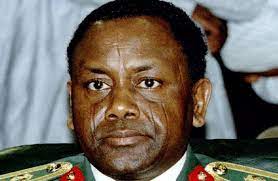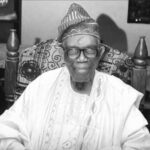“All the allegations leveled against the personality of General Sani Abacha will remain allegations. It is ten years now…”. – GENERAL BUHARI.
“The allegations leveled against (Abacha) are unfounded and baseless…It is not true that he looted the public treasury. I knew Abach because I was close to him”. – GENERAL IBRAHIM BABANGIDA
“It is quite unfortunate and unfair to accuse the family of late Sani Abacha of looting public funds”. – GENERAL ABDULSALAMI ABUBAKAR
Last weekend, the tenth anniversary of the death of General Sani Abacha was commemorated. It was an occasion which led to the outpouring of emotions by the very graceful Mrs. Mariam Abacha in interviews she granted the press, as well as the appearance of advertisement in various Nigerian newspaper, from members of the Abacha family as well as his associates. In ten years, it seems that the Abacha persona has gone through a remarkable metamorphosis in sections of the Nigerian society. It is part of the complicated baggage of the nation-building process in our country, that many people now look back nostalgically to the Abacha era in comparison with the dashed hopes which followed the transition of 1999, and the absolutely incompetent regime of General Olusegun Obasanjo.
In our culture, it is the norm, that we must not speak evil of the dead. However, for the sake of the progress of society, and the respect due to the living, we must always speak the truth. This is especially true of the dead, who played an important role in the evolution of socity. And few would dispute the fact that General Sani Abacha ruled Nigeria at a most disturbed period in our national history. Not a few people remember the authoritarian ambience within which the Abacha regime operated, clamping down on an opposition that was equally determined to express the general longing for democratic freedoms and a complete rejection of military dictatorship. Abacha made the unfortunate choice to rule Nigeria, at a point when the military had been de-mystified as a ruling group thanks to the massive corruption which a succession of military regimes had presided over and the prostrate state they had left Nigeria. A transition to democracy because something close to a mythical answer to all the problems of the country; so when that transition was truncated, with the annulment of the June 12, 1993 elections, hope in several directions was shattered: the hope to end military rule; the hope that power was about to shift to a Yoruba man; the hope of a new start for the country, with the unique, Muslim-Muslim ticket,. It was indeed a recipe for chaos and the nation was pushed to the brinks of an abyss!
The crisis which this epoch in our national life generated, found the depth it reached, because some of the most educated elements of the nation’s society, many of them from Southern Nigeria, certainly found the military elite’s game of manipulation of the levers of power so offensive and unacceptable, and therefore readily joined the movement to end military dictatorship. This was the ambience within which General Sani Abacha entered the stage of our national history. He chose to confront the crisis which he inherited, with the most dictatorial fist, and an incredibly authoritarian ambience was cast upon Nigerian society. The more repressive the regime became, the more obvious it became, that military rule had become completely discredited in Nigeria, just as it was around the world. The military which used to intervene with a messianic delusion of correcting the wrongs of the civilians had a score card of scandalous corruption; a systematic plunder of the Nigerian state and the impoverishment of the mass of the Nigerian people by the time Abacha took over power. It was the hope to build a new society away from the ruins of military dictatorship, which led to the resistance which the Abacha regime faced. Military rule by the end of the Abacha regime was completely rotten and the people has become completely fed up by with the way we were ruled like a conquered territory. In the hands of the Nigerian military, the Nigerian state, which was a notoriously prebendal one, made the rapid deterioration into rogue and failing state.
Against this background, the civilian administration of General Olusegun Obasanjo tried to milk the anger against the regime of Sani Abacha to satisfy its own end, maximally. The infamous ”Abacha loot” was kept in the public gaze till the end of the regime and Nigeria went through the spectacle of the Obasanjo administration, adding recovered monies from such loot, as part of appropriations for some of the budgets of the administration. Unfortunately for Nigeria, the Obasanjo regime proved so hopelessly corrupt and absolutely incompetent, that new comparisons emerged in the public realm. All of a sudden, the erstwhile reviled Abacha era, was beginning to be mentioned in far more favourite terms, in comparison with the civilian regime of Obasanjo. So spectacularly did Obasanjo squander the good will and hope of Nigerian people that the rehabilitation of General Abacha crept upon the country in a most surreptitious manner. It was this combination of circumstances, which emboldened retired Generals Buhari, Babangida and Abubakar to launch their revisionist re-reading of history about General Sani Abacha last weekend.
What the Generals are telling us today is that their colleague was a victim of a campaign which had no basis in reality. Of course, military men cannot throw away the esprit-de corps, which sits centrally at the heart of their training. But in this instance, the camaraderie of military training cannot rescue the generals from the opprobrium which they have carried from those who read a different narrative into the most recent events of Nigerian history. Expectedly, reactions have been very swift. THE NATION newspaper of Tuesday, June 10th, 2008 reported Lai Mohammed, the spokesperson of the Action Congress (AC) as describing the comment of the threesome as a “disgusting case of revisionism”; he argued that it was ridiculous and curious for the three former military rulers to wait for ten years before finding their voices to defend General Sani Abacha. THE SUGGESTION BY General Abdulsalami Abubakar, that past regimes should not be probed, “smacked of self-preservation”. If such an advise was heeded, efforts to enthrone the rule of law, due process, probity and good governance would be thwarted, according to Lai Mohammed and AC.
It was indeed curious that the new reading of history came barely a few days after the government of Switzerland claimed that it had returned all of the $505 million (N59.5 billion) “looted funds” stacked in its banks by the late General Sani Abacha. This was just a part of the estimated sum of $3 billion that became know as the “Abacha loot”. It is also true, that none of the ex-heads of state ever raised a voice to defend General Sani Abacha, at the height of the orchestrated campaign of the Obasanjo administration, to institute a regime of revenge rather than a systematic effort to genuinely repatriate funds which belonged to the Nigerian people. A Lagos lawyer, Mr. Babatunde Oshilaja asked of the three Generals “who constituted them into a board of inquiry, where did the board sit and how many Nigerian submitted memoranda to them?”Oshilaja then added that “we have evidence from Switzerland and England that Abacha looted then nation’s funds, and some are already being repatriated home”.
But beyond the issue of Abacha’s culpability in this instance, I think a fundamental issue is underlining the latest controversy. It has everything to do with what elements in political, intellectual and media circles, especially in South Western Nigeria continue to refer to as “the National Question”. While the PDP elite continue to ran down our throats, Democracy Day“, every May 29th, those on the other side of the divide reject it and have always insisted on a reification of June 12, as the symbolic, emblematic date for the “National Question”, simply put, June 12, from this standpoint is a superior expression of long held hopes to re-make Nigeria in the image of political forces that valorize what is equally described as “True Federalism”, a beast (of no nation, with apologies to Fela Anikulapo Kuti) which appears in all manners of guises to whoever attempts to define it: from a loose federal centre, revenue derivation to the gerontocratic, Anthony Enahoro even want the nation constituted into ETHNIC regions, never mind the fact that our history has never recorded such neat ethnic divides before). This vision has been very much at the base of the editorials in THE NATION of Monday June 9, Tuesday, June 10 and Wednesday, June 11, 2008 respectively. What the intervention of the three Generals has opened up is the depth of contradiction lying at the heart of the nation-building process in Nigeria. Such a contradictory process will let out a lot of sparks. It the generals did not intend to provoke angry responses they must have been very naïve indeed; but they could not have been naïve. I think they chose the fluidity of the political process and the growing exasperation with the civilian regime, from the eight wasted years of Obasanjo to the “standstill” regime, of Yar’adua, to launch their project of historical revisionism. The last has not been heard of this new controversy.
ALHAJI YAHAYA MAADAWAKIN ILORIN: TEN YEARS AFTER
Last Thursday marked the tenth anniversary of the death of Alhaji Yahaya, the late Maadawakin Ilorin; to commemorate the event, a public lecture was delivered in Ilorin, by former Chief Justice of Nigeria; my cousin, S.M.A. Belgore. It was a lecture which fittingly explored the history of the city and the mosaic which our forefathers wove into the rich tapestry which the city eventually became. It was a fitting tribute to the late Yahaya, one of the grand old men of Northern Nigeria, who stood shoulder-to-shoulder with the Sardauna and other early leaders of the North, to build our region and country, while also providing examples of selfless service. During the 1950s in Ilorin, political decisions had to wait for Malam Yahaya’s leadership, rather like what Dr. Abubakar Olusol Saraki does today.
As a Minister of Health of Northern Nigeria, Malam Yahaya was responsible for the construction of the Ilorin General Hospital, which is the University of Ilorin Teaching Hospital today. The early leaders of Northern Nigeria, to whom Alhaji Yahaya belonged, were all trained at the Barewa College; they forged a bond of friendship and political alliances which they put at the service of all our people in a very selfless manner. Leadership recruitment had a steady base during their time, and we must learn from their example to build a new tradition of responsive, responsible and focused leadership to re-build our region and our country today.


